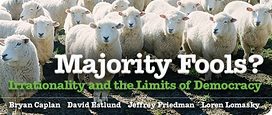In his post “Overruling the Majority,” Caplan says that this conversation shows “how uncomfortable people are at the idea of overruling the majority.”
Few believe that majority rule ought to be unlimited; I certainly don’t. Some think the limits can all be explained by the goal of protecting democracy itself, but I doubt that could explain why a majority may not boil anyone in oil, for one example. So I think there are limits to democratic authority, even though it is hard to say where they are and why. If there is someone who is uncomfortable with ever overruling the majority, I don’t know who they are, but I agree with Caplan that they are wrong. If he means me (and, as I write, no one else contributed anything yet) I have only argued here that the majority cannot always be overruled simply because they are mistaken. If there’s discomfort on my part, it would be because I suspect that Caplan might think that the majority may always be overruled when it is mistaken.
In Caplan’s initial essay, interference with majority decisions was supported by pointing out that voters’ decisions don’t just affect themselves but they affect others. Now, in “Overruling the Majority” he supports overruling the majority when, and because, they harm themselves. There seem to be two cases where Caplan thinks the majority’s mistakes may be overruled: when they affect others, and when they don’t. He is very comfortable indeed with the idea of overruling the majority when they are wrong.
In case there’s still any question about the reaches of this comfort, in his reply to Lomasky, Caplan cheerfully (comfortably) allows that his analysis is much like Plato’s, the main difference being that his own is better defended. The consistent message from Caplan, so far, is that there is nothing to be said for democracy’s authority unless democracy happens to be better than any expert at getting the right answers–something he finds very unlikely. College grads and economists can, he thinks, do better. So much for democratic authority. I’m very happy to see the grounds of democratic authority questioned, since that’s how we come to understand things. At the moment, I just want it to be quite clear where the Plato/Caplan inference from expertise to authority leads. He accepts Lomasky’s label: “the Plato/Caplan antidemocrats.”
So, virtually all modern democratic thinkers agree that the majority’s authority has limits, and often the reason for the limits is to prevent the majority from marching off a cliff. That unprovocative boilerplate isn’t what Caplan argues for. He thinks that whoever knows best is thereby entitled to rule, and that it is not usually the voters. So what needs to be engaged (as I have tried to do in previous posts) is this ancient theory of authority.

